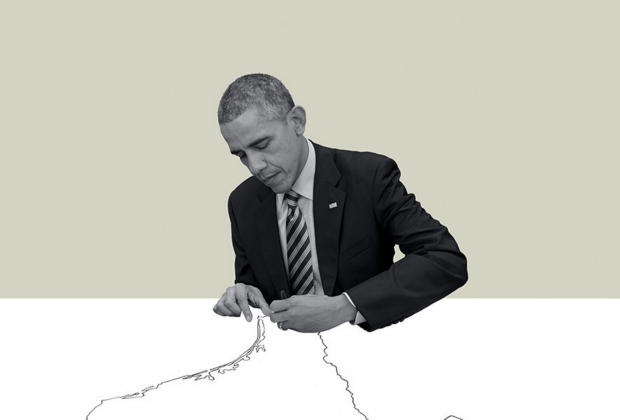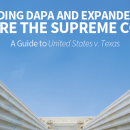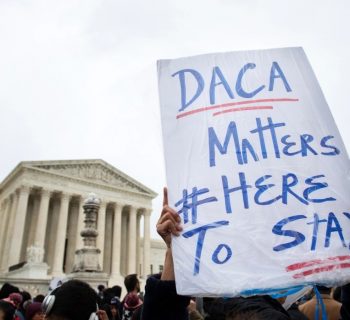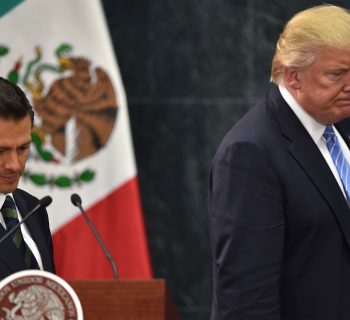By RICHARD G. LUGAR, N.Y. Times ~ April 18, 2016
THE legal controversy surrounding the Obama administration’s immigration enforcement policies will soon come to a head when the Supreme Court justices hear the case United States v. Texas on Monday. Texas claims that the president’s executive decisions lack legal sanction by Congress and have injured the state.
But whether or not you like President Obama’s actions, he has operated under longstanding provisions of law that give the executive branch discretion in enforcement. This presidential prerogative has been recognized explicitly by the Supreme Court. Moreover, the nature of immigration enforcement and the resources (or lack thereof) appropriated by Congress necessitate exactly the type of choices that the president has made.
Congress has repeatedly granted the executive branch broad power in enforcing immigration laws. The 2002 law creating the Department of Homeland Security explicitly said the executive should set “national immigration enforcement policies and priorities.” The Supreme Court has recognized the leeway Congress gives the executive branch in deportations. In a 2012 majority opinion written by Justice Anthony M. Kennedy and joined by Chief Justice John G. Roberts Jr., the court noted that “a principal feature of the removal system is the broad discretion exercised by immigration officials,” including the decision “whether it makes sense to pursue removal at all.”
Setting enforcement priorities is vital to the effectiveness of our immigration laws. Congress can’t anticipate every situation. This is why the Supreme Court recognized in 1950 that immigration law is an area where “flexibility and the adaptation of the congressional policy to infinitely variable conditions constitute the essence of the program.”
The immense moral and legal consequences of a deportation campaign targeting up to 11 million undocumented immigrants are obvious. Even Americans whose frustration has overcome their compassion and led them to support the harshest immigration enforcement would be likely to reconsider if they actually saw such an operation in action.
A huge roundup like that would require an extraordinary expansion of federal law enforcement capabilities and resulting intrusions into American society. But in reality, there is no prospect for such a campaign because Congress has not made available more than a small fraction of the necessary money and manpower.
This is why, by its nature, immigration enforcement requires executive discretion.
The administration’s initiatives allow Homeland Security officials to forgo deportation, on a case-by-case basis, of undocumented residents who came here as children before June 15, 2007, and of certain undocumented parents of children who are American citizens or legal residents. Both are in keeping with similar programs put in place by both Republican and Democratic presidents dating from the Eisenhower administration.
In 1990, for example, under President George H.W. Bush, the immigration service, relying in part on authority dating from the Reagan administration, offered extended voluntary departure and work authorization to the spouses and children of aliens who had previously been granted legal status.
President Obama’s actions, therefore, are hardly unprecedented. There are two major differences. First, he gave speeches advocating for explicit programs with names, rather than relying on subtler agency direction.
Second, immigration policy has been caught up in today’s hyper-partisanship, where a strident anti-immigration tide within the Republican Party overwhelms all bipartisan compromise. All 26 state officials who have challenged the administration’s executive actions in the Supreme Court case are Republicans, and last month the G.O.P.-led House of Representatives voted to file an amicus brief on behalf of the entire House.
From these howls of outrage, you wouldn’t know that the Obama administration has vastly exceeded the deportations under President George W. Bush. And Mr. Bush vastly exceeded those of President Clinton. President Obama’s directives to focus enforcement efforts on those who have committed crimes in the United States and recent border crossers are a rational executive prioritization, given the resources and the realities.
These facts undercut Texas’s argument that it is unduly burdened by the president’s decisions. With deportations aimed at criminals and new border crossers, we would seem close to an optimal state-friendly federal immigration policy.
When the president took his executive action on immigration, he was not flouting the will of Congress; rather, he was using the discretion Congress gave him to fulfill his constitutional duty to “take Care that the Laws be faithfully executed.”







